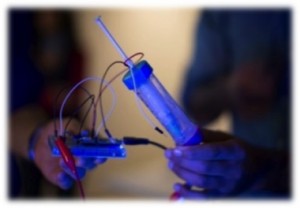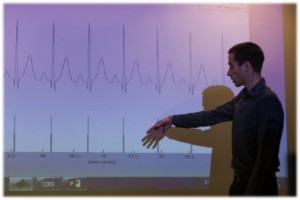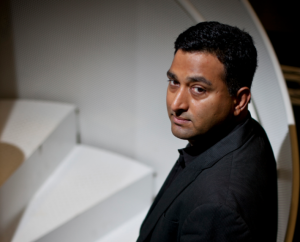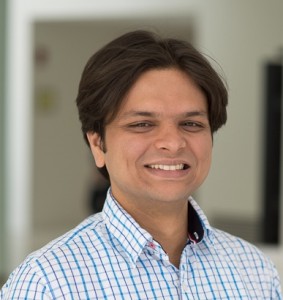Engineering Health: Understanding & Designing Affordable Health Diagnostics
MAS.S62 (Graduate)
Instructors: Anshuman Das, Pratik Shah Mentor: Ramesh Raskar
TAs: William S. Lee, Jamie Schiel, Devesh Jain, Pushyami Rachapudi
Lectures and Discussions: Friday 1-4, E15-341
Follow us on Facebook!
Design and build novel health diagnostics and sensors while learning the fundamentals of rapid prototyping, applied optics, signals processing, imaging and other advanced sensing modalities. Students work in teams with a physician and technical mentor to design and construct a cutting edge health diagnostic or device. Exceptional projects will be invited to participate in an optional workshop in India to further develop their device.
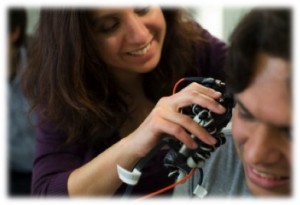
Top projects will also have the option to continue their projects in the Spring semester through a clinical trials and ventures program with the goal of reaching early trials by the end of the school year. Example projects include spectroscopic sensing of ear infection, an automated stethoscope, non-contact blood pressure sensors, ultra wide angle endoscopy, and wound perfusion monitoring. Structured labs will build engineering and design skills, lectures will introduce considerations for medical design and new prototyping techniques. Grading is based on labs, problem sets, and the semester project, all detailed below. (Please note participation in the optional India workshop & clinical trials program mentioned above do NOT contribute to the grade in MAS.S61).
Weekly class structure: Each class will be divided into sections. The first section will cover novel prototyping techniques relevant for healthcare, including hands-on lab exercises. Examples include signals processing to build a basic ECG, to build a pulse oximeter, and utilize a portable spectrometer. The second section will cover topics relevant to designing diagnostics, including introduction to user centered design, physician panel discussion on what they look for in new diagnostics, and guest speakers with experience in health engineering. The third section of the class will be devoted to design reviews and breakout sessions for students to get feedback on their semester projects.
Labs: Each week we will host a one hour lab. For the first few sessions these will be small skill-building technical challenges graded independently. Once the semester projects begin, the labs will be tied to the specific project you are working on and are designed to help push your projects to completion.
A one page lab report should be handed in by each group (one per group, not per student), at the beginning of the following class. The report should contain a sample of the device’s output data, a picture of the final device, and a one paragraph reflection on what you learned, what was difficult and what you would do differently if you had to do it over. Each report is graded out of 10 with five points for your data and five points for your reflection. Make sure the names of ALL members of your group are on the report you hand in.

Semester project: Starting in week three, students will meet physician mentors, assess clinical problems, and choose from a variety of possible health diagnostic projects, to form multidisciplinary teams. Each team will have a physician and technical mentor dedicated to their project. Students will spend the rest of the semester:
- Examining the medical need
- Designing a novel diagnostic
- Prototyping their design
- Getting feedback from patients and providers
- Iterating on the design.
Successful projects will have the optional opportunity to continue working towards a clinical trial with a trip to India to learn about design for low resource settings, and in the Spring semester as part of Engineering Health II in preparation for a clinical trial and roll out of their new device.
Course Goals:
The overall goal of Engineering Health is to provide MIT students with new technical skills in rapid prototyping and specific knowledge of what it takes to design medical diagnostics. Furthermore it hopes to identify students interested in working on health diagnostics as part of an ongoing project with the aim of building a novel device that will be used in live settings in the next 12 months.
E-mail Lists and Website:
The class will utilize a Google Group for inter-team discussion and relevant updates. There is also a long-standing Facebook group where we will ask students to periodically post comments and updates on lecture topics and their design exercises. Formal course communication will be via Stellar.
Travel Opportunities (Local & India):
This course includes a field trip to a clinic/hospital. Additionally there are various opportunities for students to test and deploy their project in the field with our partners in Mumbai and Hyderabad India. A group of students from last year’s class travelled to Mumbai over IAP to further develop their projects and work with local physicians as part of a workshop. This opportunity will be again available this year on an optional, invitation basis. Students taking Engineering Health are invited to apply for travel funding through the MIT TATA Center. Further information is available by contacting the instructors.
Course Grading:
Grading criteria is broadly similar for the graduate or undergraduate credit.
Class Participation and Attendance – 10%
Lab 1 – 10%
Lab 2 – 10%
Lab 3 – 10%
Final Presentation and video – 60%
Teaching Staff and Background:
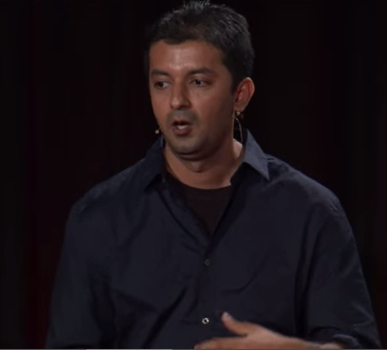
Ramesh Raskar PhD (http://raskar.info) is an Associate Professor and head of the Lab’s Camera Culture research group. (Mentor)
Anshuman Das PhD (ajdas@mit.edu) is a Postdoctoral Associate in optics and material physics at the Camera Culture Lab, MIT Media Lab. (Instructor)
Pratik Shah PhD (pratiks@media.mit.edu) is a Research Scientist in the area of infectious diseases at Camera Culture Lab, MIT Media Lab. (Instructor)
Research Mentors:
- Hadley D. Sikes, Asst Professor, Chemical Engineering, MIT
- Sangeeta Bhatia, Prof, HST/EECS/IMES, MIT
- Rohit Karnik, Prof. MechE, MIT
- Pratik Shah, Visiting Postdoctoral Scholar Broad Institute MGH
- Rich Fletcher, Research Scientist, D-Lab, MIT
- Ted Liao, Boston University
- Kim Hammad Schifferly, MIT Lincoln Labs
- Kris Olson, MGH Center for Global Health
- Jacqueline Linnes, Boston University
- Anne Goldfeld, Brighman and Women’s Hospital
- Everett Lawson, Camera Culture Group, MIT Media Lab
- Bruce Hecht, Staff Engineer at Analog Devices
- Athanasios Athanassiadis, ReDX Instructor, Graduate Student Mechanical Engineering
- Neil Patel, Biomedical Engineer
Physician Mentors:
- Steve Schwaitzberg, Chief of Surgery, Cambridge Health Alliance, Harvard Medical School
- Rajiv Gupta, MD, PhD, MGH
- Israel Green-Hopkins, MD, Staff Emergency Physician at Boston Children’s Hospital & Instructor at Harvard Medical School
- Ivan Luptak, MD, PhD, Staff cardiologist at Boston Medical Center
- Ayesha Khalid, MD, Staff Otolaryngologist, Cambridge Health Alliance
- Randall Bock, MD, The Medical Treatment Center of Revere
- Ugwuji N. Maduekwe, MD, Surgeon at Cambridge Health Alliance
- Rao Prabhala, PhD, Researcher & Instructor at Harvard Medical School
- Vincent James Patalano II, MD, Chief of Ophthalmology, Cambridge Health Alliance
- Ellen Weinberg, MD, Otolaryngologist at Cambridge Health Alliance
- Timothy Peck, MD, ER Physician at Beth Israel Deaconess
- Usha Periyanayagam, MD, ER Physician & Global Health Researcher at Brigham and Women’s Hospital
- David Diamond, MD, Associate Director of MIT Medical
- Aristotelis Filippidis, MD, Neurosurgical Fellow at Boston Medical Center
- Cathy Stern, OD, Developmental / Behavioral Optometrist
- Daniel Kirshenbaum, MD, Chief Medical Resident at Boston Medical Center
- Roy Arjoon, MD, Medical Resident at Boston Medical Center
- Jennifer Joe, MD, CEO Medstro, Editor in Chief MedTech Boston, Nephrologist
- Ilan Shahin, MD, Health Innovation Fellow at Women’s College Hospital and Family Physician
- Stephen Pomedli, MD, Health Innovation Fellow at Women’s College Hospital and Family Physician
- Naheed Dosani, MD, Palliative Care Physician & Assistant Clinical Professor at McMaster University, Columnist at Healthdebate.ca
- Ravdeep Kukreja, MD, Emergency Medicine Physician
Entrepreneurship & Design Mentors:
- Sridhar Iyengar, CTO & Founder of AgaMatrix, CTO & Founder of MisFit Wearables
- Krishna Yeshwant, MD, Google Ventures
- John Werner, Camera Culture, MIT Media Lab
- Betsy Goodrich, Manta Design Firm
- Zen Chu, Senior Lecturer Healthcare Innovation, MIT Sloan, Cofounder Hacking Medicine, Venture Capitalist
- Teppo Jouttenus, Relationship Manager EdX & Education Entrepreneur
- MJ Jouttenus, ESOL Teacher & Education Entrepreneur
- Michal Depa, CTO & Co-founder of Jana Care
- Shireen Taleghani, Co-founder at 6SensorLabs, inc.
- Sean Duffy, Co-founder & CEO of Omada Health


